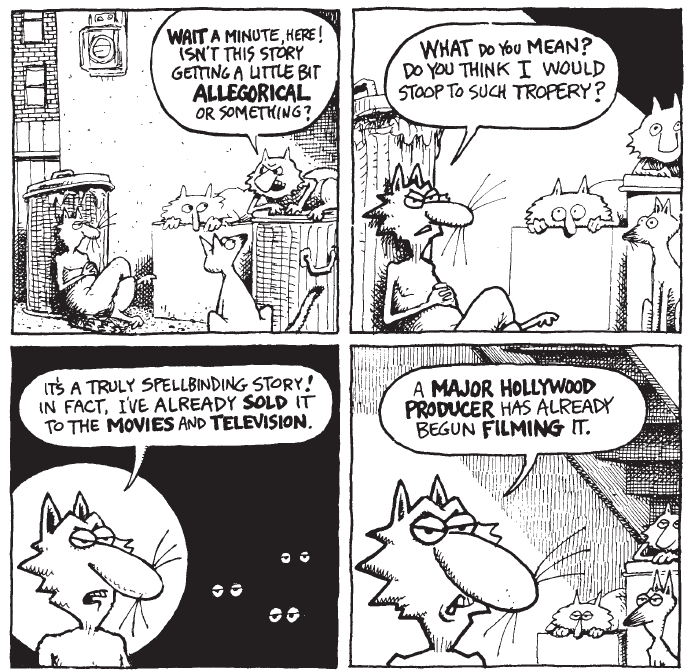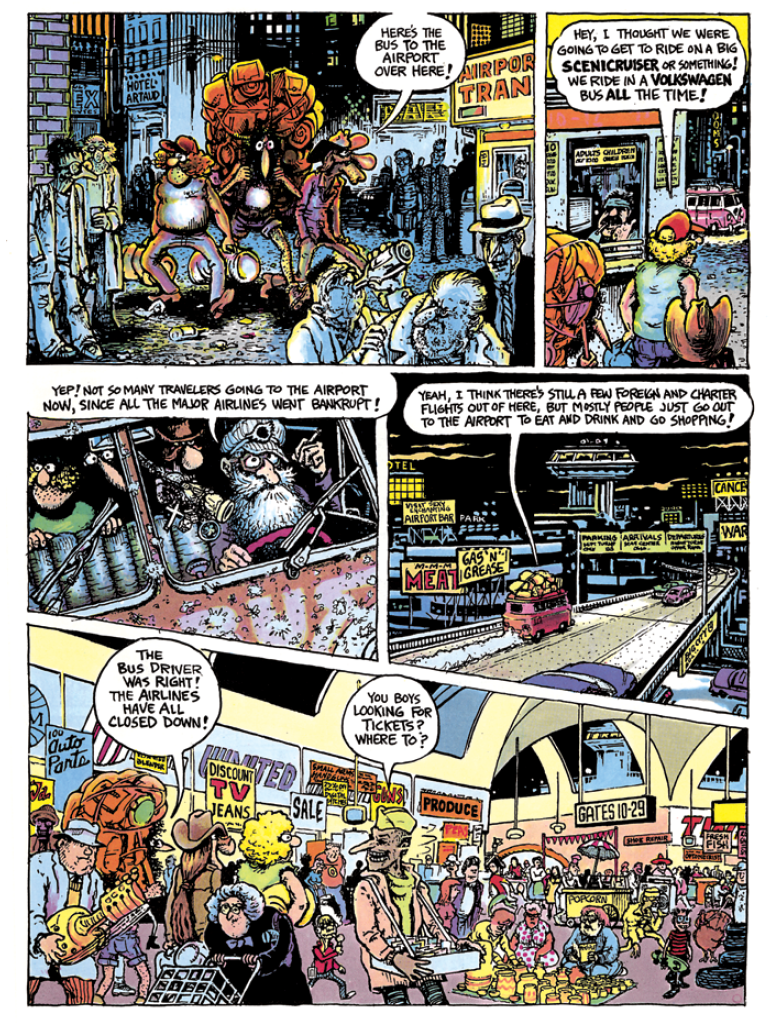Of all the seminal underground comics, Gilbert Shelton’s The Fabulous Furry Freak Brothers is arguably the most conventional, despite the constant drug references and occasional NC-17 moment. It is at its core, after all, focused on the classic “trio of dunderheads” style of comedy that gave rise to the Three Stooges, the Marx Brothers (post-Zeppo), etc. In other words, the basic formula is familiar, it’s just that the references here cater to a more drug-friendly crowd. Shelton’s comics are largely not as in-your-face offensive as Crumb’s or Wilson’s, not as overtly political as Spain’s, not as abstract or conceptual as Griffin’s and Moscoso’s.
So it’s not much of a surprise that the series recently was spun off into an streaming animated comedy series (on the Tubi service, if you’re so inclined), shoving the lovable trio of stoner hippies into our current era via the odd bit of time travel nonsense. Nor is it any surprise that the show, based on my viewing of the pilot episode, is absolute garbage.
The quality of the new series aside, the show is as good a reason as any to repackage the Brothers’ sequential adventures in shiny new books. (Knockabout released its omnibus edition of the series back in 2008. Time flies.) Now it's Fantagraphics’ turn, with the company putting out a whole line of handsome hardcover editions, complete with die-cut covers, emphasizing Shelton’s influence and elder statesman status. These are important comics, folks.
As with their Carl Barks collections, Fantagraphics is releasing the Freak Brothers books out of chronological order; the first release is actually volume 6, the “Idiots Abroad” saga, comprised of comics originally published from 1982 to 1987. That’s no real surprise, given that the storyline is generally regarded as one of the best of the series, if not the best. It even ranked a respectable #44 on the Journal's list of the top 100 comics of the century (issue #210 for all you eager indexers), with Ray Mescallado writing that “[Shelton’s] delight in putting his main trio through their paces remains unabated: somehow, the Freak brothers continue to amuse with their individual quirks and idiocies.”
Still, that was back in 1999. A whole generation ago. The central question here is: do the trio continue to amuse today in the COVID-19 era? The answer is yes, for the most part. There is some aging to be sure around the frayed edges of this decades-old satire, but Shelton’s and Mavrides’ gleeful counterculture nose-thumbing goes down relatively well despite the nods to one-world conspiracy theories and free-spirited individualism that was already starting to congeal into libertarianism (and would get much worse in the ensuing decades).
The plot: hearing that weed is practically free in Bogotá, Phineas, Freewheelin’ Franklin and Fat Freddy pack their bags. Naturally, they only get as far as the airport before splitting off into three diverse directions. Franklin ends up in Central America, where he encounters leftist guerrillas and pirates. Freddy, meanwhile, wanders through Europe before sabotaging a May Day parade in Moscow. And Phineas ends up in Mecca, where he gets the bright idea to start his own fundamentalist religion. There’s also a side plot involving the U.S. military and a group of radical terrorists joining forces to take over the world. Everything gets cleared up and reset at the end, though not without a lot of explosions.
To be sure, there are story elements here that could give at least a raised eyebrow, if not necessarily a tag of “problematic”, the most obvious being Phineas’ journey. However, Shelton and Mavrides seem to be more interested in swiping at fundamentalism in general–especially televangelism with the occasional jab at cults–than Islam specifically. Indeed, most of the cartoonists’ targets here are broad and familiar to the average underground comics reader: the military-industrial complex; organized religion; corruption; greed; stupidity; laziness; and a sheepish public who are more than happy to give their selfhood up to those in power.
Shelton and Mavrides wisely keep the story moving at a brisk pace, with any pause in shenanigans offering the perfect opportunity to segue to another different storyline. There’s a–dare I say it–frenetic rhythm that is absolutely necessary in a farce of this nature, and the pair do a solid job of making sure the jokes tumble in, one after the other, even if it’s only a goofy drawing or two.
And there are good jokes. I appreciated, for example, Freddy’s and Franklin’s hardcore indoctrination into becoming not just sophisticated, super-intelligent gents, but also tech-savvy spies, only to have all their knowledge quickly dissipate at the first toke. In many cases it’s the small asides that are best; at one point, Franklin imagines creating a “Franklin and the Pirates” comic strip, only to have a character upbraid him for the U.S. involvement in El Salvador. The funniest part, however, might be the Fat Freddy’s Cat bonus story in the back of the book that involves the title feline fighting hordes of cockroaches, erupting into a Tex Avery-ish fury near the end.
Honestly, what impressed me the most in this collection was not the humor as much as the staggering amount of detail Shelton and Mavrides cram into every panel. (I have no idea what the actual division of labor entailed; Mavrides is also credited as the colorist, in collaboration with Guy Colwell.) Pages and panels of lush tropical settings and crowded city streets are rendered so exhaustively that it seems as though every leaf, building and cobblestone is present and accounted for. If anything is due for a re-examination in this new edition, it’s the duo’s artistic chops.
Sure, not every joke in The Idiots Abroad and Other Follies still lands, and there are certainly aspects that seem dated and occasionally cringey–although just as many still seem unfortunately relevant–but overall this new, well-produced collection affirms that while Shelton’s creations might not be as subversive as they once were, they’re still pretty entertaining all the same.











